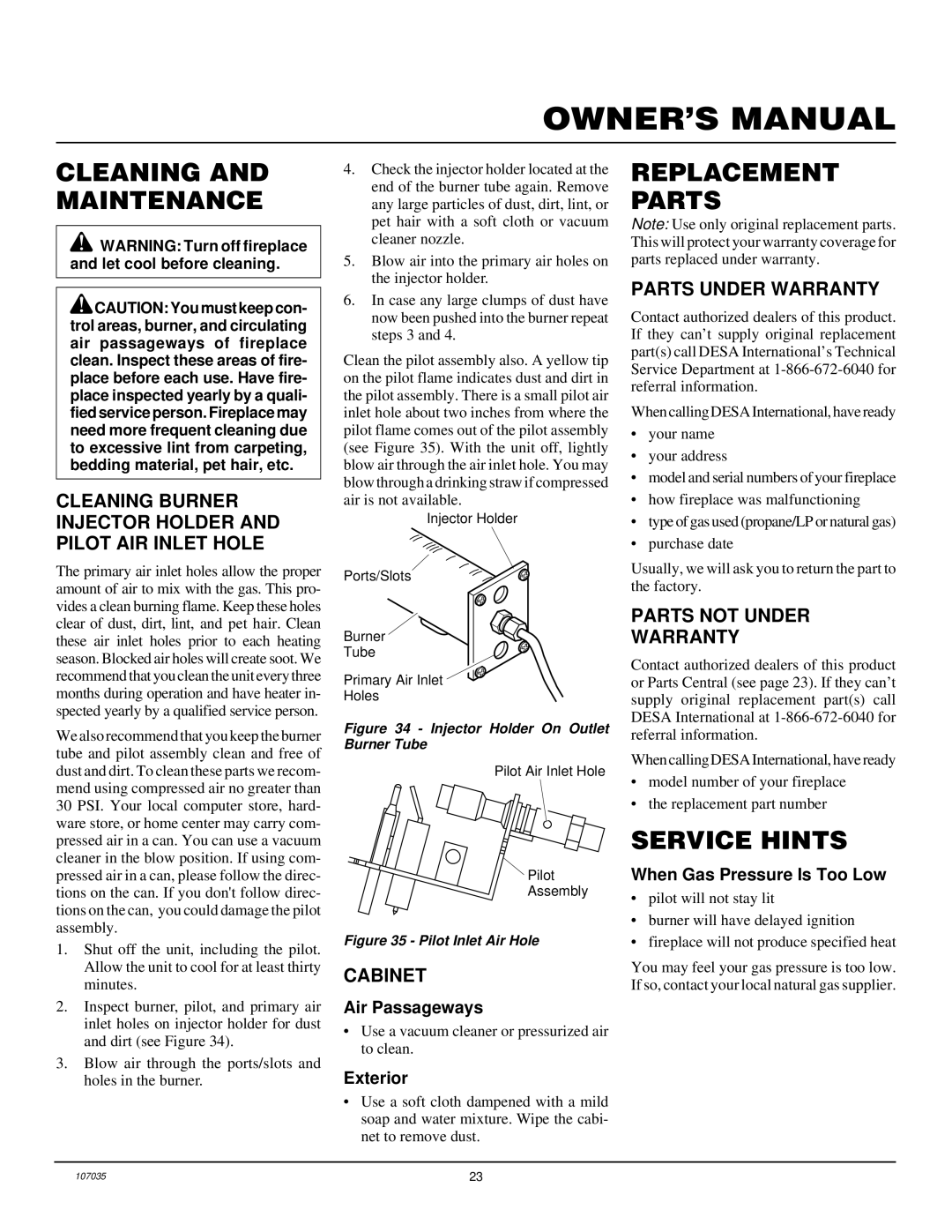
OWNER’S MANUAL
CLEANING AND MAINTENANCE
![]() WARNING: Turn off fireplace and let cool before cleaning.
WARNING: Turn off fireplace and let cool before cleaning.
![]() CAUTION: You must keep con- trol areas, burner, and circulating air passageways of fireplace clean. Inspect these areas of fire- place before each use. Have fire- place inspected yearly by a quali- fied service person. Fireplace may need more frequent cleaning due to excessive lint from carpeting, bedding material, pet hair, etc.
CAUTION: You must keep con- trol areas, burner, and circulating air passageways of fireplace clean. Inspect these areas of fire- place before each use. Have fire- place inspected yearly by a quali- fied service person. Fireplace may need more frequent cleaning due to excessive lint from carpeting, bedding material, pet hair, etc.
CLEANING BURNER INJECTOR HOLDER AND PILOT AIR INLET HOLE
The primary air inlet holes allow the proper amount of air to mix with the gas. This pro- vides a clean burning flame. Keep these holes clear of dust, dirt, lint, and pet hair. Clean these air inlet holes prior to each heating season. Blocked air holes will create soot. We recommend that you clean the unit every three months during operation and have heater in- spected yearly by a qualified service person.
We also recommend that you keep the burner tube and pilot assembly clean and free of dust and dirt. To clean these parts we recom- mend using compressed air no greater than 30 PSI. Your local computer store, hard- ware store, or home center may carry com- pressed air in a can. You can use a vacuum cleaner in the blow position. If using com- pressed air in a can, please follow the direc- tions on the can. If you don't follow direc- tions on the can, you could damage the pilot assembly.
1.Shut off the unit, including the pilot. Allow the unit to cool for at least thirty minutes.
2.Inspect burner, pilot, and primary air inlet holes on injector holder for dust and dirt (see Figure 34).
3.Blow air through the ports/slots and holes in the burner.
4.Check the injector holder located at the end of the burner tube again. Remove any large particles of dust, dirt, lint, or pet hair with a soft cloth or vacuum cleaner nozzle.
5.Blow air into the primary air holes on the injector holder.
6.In case any large clumps of dust have now been pushed into the burner repeat steps 3 and 4.
Clean the pilot assembly also. A yellow tip on the pilot flame indicates dust and dirt in the pilot assembly. There is a small pilot air inlet hole about two inches from where the pilot flame comes out of the pilot assembly (see Figure 35). With the unit off, lightly blow air through the air inlet hole. You may blow through a drinking straw if compressed air is not available.
Injector Holder
Ports/Slots
Burner
Tube
Primary Air Inlet
Holes
Figure 34 - Injector Holder On Outlet Burner Tube
Pilot Air Inlet Hole
Pilot
Assembly
Figure 35 - Pilot Inlet Air Hole
CABINET
Air Passageways
•Use a vacuum cleaner or pressurized air to clean.
Exterior
•Use a soft cloth dampened with a mild soap and water mixture. Wipe the cabi- net to remove dust.
REPLACEMENT PARTS
Note: Use only original replacement parts. This will protect your warranty coverage for parts replaced under warranty.
PARTS UNDER WARRANTY
Contact authorized dealers of this product. If they can’t supply original replacement part(s) call DESA International’s Technical Service Department at
When calling DESA International, have ready
•your name
•your address
•model and serial numbers of your fireplace
•how fireplace was malfunctioning
•type of gas used (propane/LP or natural gas)
•purchase date
Usually, we will ask you to return the part to the factory.
PARTS NOT UNDER
WARRANTY
Contact authorized dealers of this product or Parts Central (see page 23). If they can’t supply original replacement part(s) call DESA International at
When calling DESA International, have ready
•model number of your fireplace
•the replacement part number
SERVICE HINTS
When Gas Pressure Is Too Low
•pilot will not stay lit
•burner will have delayed ignition
•fireplace will not produce specified heat
You may feel your gas pressure is too low. If so, contact your local natural gas supplier.
107035 | 23 |
